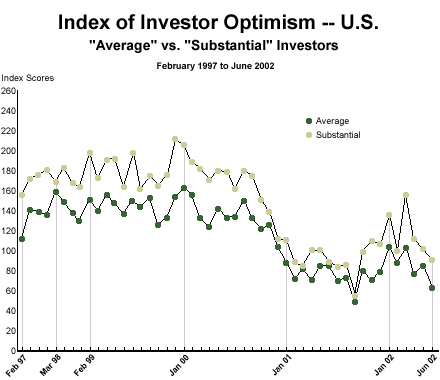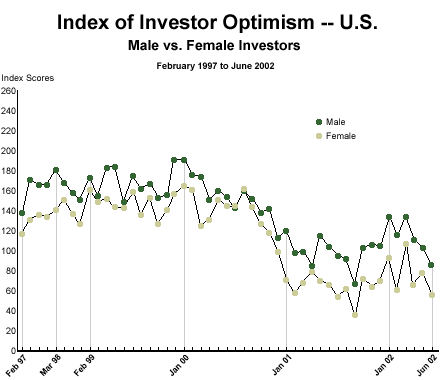New Gallup/UBS Index of Investor Optimism -- U.S. poll data for June* show overall investor optimism has fallen to 72 points, its second-lowest level ever. This drop is a clear sign that many investors doubt their ability to preserve their capital, let alone achieve gains, as uncertainties ranging from corporate malfeasance to terrorism buffet the world's markets. This is obviously bad news for the U.S. economy's immediate future (see "Can Europe Recover Without the U.S.?"). The recent decline is all the more important because it is so widespread. The current crisis of confidence affects all types of investors -- big and small, male and female, etc. I believe that most investors feel powerless to make good decisions in the current environment. This produces both a "wealth effect" and a loss of consumer confidence that combine to negatively impact consumer spending.
Generally, I place more significance on optimism among "substantial" investors (i.e., those with $100,000 or more of investable assets) than optimism among other investor groups -- a position supported by econometric analysis. While focusing on substantial investors sometimes offers a brighter picture, in this instance those investors are no different from others in terms of their optimism about the future as the third quarter begins. Further, the Personal Dimension of all of these indices is very weak -- another bad sign. Adding these new data to an already tempestuous economic climate leads me to the unavoidable conclusion that a double-dip recession is more likely later this year than many economic analysts had anticipated.
Optimism Drops Among Average and Substantial Investors
Overall optimism among substantial investors fell from 155 in March to 111 in April and 101 in May. In June, it fell again to 90 -- its lowest level since Sept. 11. Overall optimism among average (non-substantial) investors fell from 102 in March to 76 in April. It then moved up to 84 in May before it fell again in June to 62 -- its second-lowest level since measurement began in October 1996.
Even more troubling than the decline in the overall Index is the decline in the Personal Dimension. The Personal Dimension for substantial investors fell to 69 in June -- just eight points above its September 2001 low of 61. The overall Personal Dimension for average investors fell to 56 in June, putting it below its previous low of 61.

Optimism Drops Among Male and Female Investors
Overall optimism among male investors fell from 133 in March to 110 in April, then to 102 in May and 85 in June -- its lowest level since Sept. 11, and virtually tying its second-lowest level ever (84 in April 2001). Overall optimism among female investors fell even more drastically from 106 in March to 65 in April. It then moved up to 77 in May before falling again in June to 55 -- its second-lowest level ever.
The Personal Dimension for male investors fell to 64 in June -- essentially matching its September 2001 low of 63. The Personal Dimension for female investors fell to 57 in June, virtually the same level as its all-time lows -- 55 in July 2001 and 59 in September 2001.

*Results for the total dataset are based on telephone interviews with 1,000 investors, aged 18 and older, conducted June 1-14, 2002. For results based on the total sample of investors, one can say with 95% confidence that the margin of sampling error is ±3 %.
